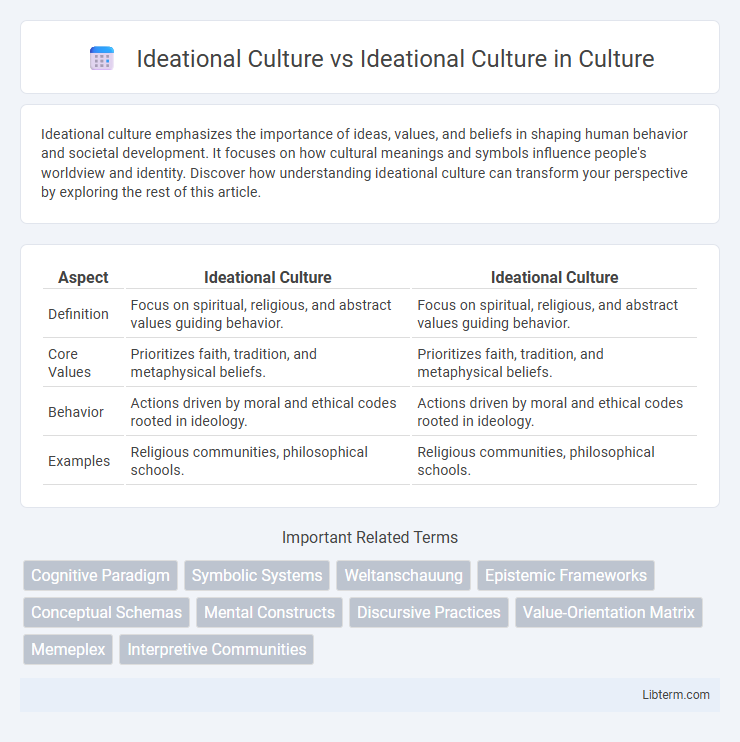Ideational culture emphasizes the importance of ideas, values, and beliefs in shaping human behavior and societal development. It focuses on how cultural meanings and symbols influence people's worldview and identity. Discover how understanding ideational culture can transform your perspective by exploring the rest of this article.
Table of Comparison
| Aspect | Ideational Culture | Ideational Culture |
|---|---|---|
| Definition | Focus on spiritual, religious, and abstract values guiding behavior. | Focus on spiritual, religious, and abstract values guiding behavior. |
| Core Values | Prioritizes faith, tradition, and metaphysical beliefs. | Prioritizes faith, tradition, and metaphysical beliefs. |
| Behavior | Actions driven by moral and ethical codes rooted in ideology. | Actions driven by moral and ethical codes rooted in ideology. |
| Examples | Religious communities, philosophical schools. | Religious communities, philosophical schools. |
Introduction to Ideational Culture
Ideational culture emphasizes the importance of ideas, values, and beliefs as the primary drivers of social behavior and historical change. It prioritizes symbolic meanings and the internal motivations of individuals or groups, influencing their perceptions and interactions within society. This cultural framework contrasts with materialist perspectives that focus on economic and physical conditions as determinants of cultural development.
Defining Ideational Culture: Core Principles
Ideational culture centers on the primacy of ideas, beliefs, and values as the foundation of social reality, emphasizing mental constructs and symbolic meanings over material conditions. Core principles include the notion that culture shapes human consciousness and behavior through shared ideologies, collective narratives, and symbolic representation. This framework contrasts with materialist perspectives by prioritizing cognitive and interpretive processes as drivers of societal development and human interaction.
Historical Evolution of Ideational Culture
Ideational culture, rooted in the development of symbolic systems and collective beliefs, has evolved through human history by shaping societies' worldviews, religious practices, and moral frameworks. This cultural paradigm emphasizes the transmission of ideas, values, and meanings across generations, influencing social cohesion and identity formation. Its historical evolution reflects shifts in cognitive structures and communication technologies that expanded the capacity for abstract thinking and cultural complexity.
Key Characteristics of Ideational Culture
Ideational culture emphasizes spirituality, religion, and a strong belief in transcendental realities, shaping societal values and behaviors around moral imperatives and divine purpose. Key characteristics include a collective focus on meaning and purpose, often prioritizing religious dogma and sacred texts over material or empirical evidence. This culture tends to produce societies where knowledge is perceived as a pathway to spiritual enlightenment rather than practical action.
Ideational Culture in Social Contexts
Ideational culture in social contexts emphasizes shared beliefs, values, and symbols that shape collective identity and guide social behavior. It influences communication patterns, social norms, and rituals by prioritizing meaning and worldview over material conditions. Understanding ideational culture is crucial for interpreting social cohesion and conflict within communities.
Ideational Culture and Knowledge Production
Ideational culture emphasizes symbolic systems, values, and ideas as primary drivers of social organization and knowledge production. It shapes how communities construct meaning, prioritize intellectual pursuits, and transmit knowledge through narratives, rituals, and education. This cultural framework influences the creation and dissemination of knowledge by embedding cognition within shared ideologies and collective consciousness.
Influence of Ideational Culture on Innovation
Ideational culture, centered on values, beliefs, and symbolic meanings, significantly influences innovation by shaping creativity and problem-solving approaches within organizations and societies. This culture fosters a mindset that encourages experimentation, risk-taking, and novel idea generation, leading to breakthrough innovations. In contrast, purely material or pragmatic cultures may prioritize efficiency and practicality over abstract thinking, potentially limiting the scope and impact of innovative outcomes.
Comparing Variations within Ideational Culture
Ideational culture varies significantly across societies based on shared beliefs, values, and symbolic systems that shape collective meaning and social practices. Within ideational culture, variations manifest in differing worldviews, religious doctrines, and cognitive frameworks influencing behavior, communication, and identity formation. These internal differences impact social cohesion, conflict resolution, and cultural transmission, reflecting the dynamic nature of ideational constructs across contexts.
Challenges Facing Ideational Culture Today
Challenges facing ideational culture today include the rapid globalization that dilutes traditional symbolic meanings and disrupts cultural narratives. The rise of digital communication alters how collective values and beliefs are transmitted, often leading to fragmented cultural identities. Furthermore, ideological conflicts intensify as contrasting worldviews compete for dominance within increasingly pluralistic societies.
The Future Trajectory of Ideational Culture
The future trajectory of ideational culture emphasizes the deepening integration of digital communication and virtual realities, reshaping how societies construct meaning and values. Emerging technologies like AI and augmented reality facilitate new forms of collective cognition and symbolic interaction, accelerating cultural evolution. This evolving ideational landscape prioritizes adaptability and innovation in preserving cultural identities amid global interconnectedness.
Ideational Culture Infographic

 libterm.com
libterm.com